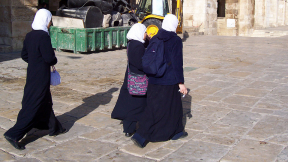
In a 2009 Gallup report on Muslim Americans, 26 percent of Muslim youth in the United States reported feeling angry as compared to 14 percent of Protestant youth and 18 percent of the general American population. This survey had 10 questions on mental health and almost all results when it came to young Muslims revealed that they were the least happy and the angriest.
There are many reasons for this. Apart from common stressors among all youth ranging from family problems to bullying, we have to consider that young Muslims today are facing more anti-Muslim feeling than in the past.
According to the National Center for Education Statistics, nearly a third of all students aged 12 - 18 reported having been bullied at school in 2007, some almost daily. Many kids who are bullied become targets because of differences in physical appearance, ranging from variations in dress, weight, skin color, and disability. As well, children with low self-esteem are more likely to become victims.
In late March 2011, a Muslim third-grader was found hanging unconscious in his school in Louisville, KY. It was not the first time Muhammad had been bullied and abused.
The same week a Muslim girl from Dreyfus School in New York was beaten up. She was thrown on the ground, had her headscarf pulled off, as she was repeatedly called a “terrorist,” “Muslim,” and a “bitch”. She was threatened to be stabbed with a knife unless she handed over her cell phone and all of her money. The victim suffered minor bruises and a cut lip. This was not the first time she was assaulted for being a Muslim. Add to this mix the declining American public opinion of Islam and young Muslims are under tremendous pressure.
There are several things that parents, teachers, relatives and the Muslim community can do to help relieve stress in children. The following tips can correct a faulty belief system as well as help relieve some of the symptoms of stress. However, these suggestions are not meant to replace medical and psychological attention.
1. It’s cliché, but communication is the number one solution
The only way you can really find out if your child is suffering from stress or anxiety is by communicating openly and frequently.
When they come home from school, turn away from the cellphone or computer and ask open-ended questions. Instead of the usual, 'how was your day?' get specific. Ask how they felt they did on the math test. Find out what happened to her favorite teacher who had been ill. Ask if any special events are going on that week or month.
By showing your interest in things that concern them, your children will open up to you.
2. Place Your Children Under Allah's Protection
Ibn 'Abbas related that the Messenger of Allah, peace and blessings be upon him, used to commend his grandsons Hasan and Hussain to Allah's protection by saying: "I commend you two to the protection of Allah's perfect words from every devil, vermin, and every evil eye" (Al-Bukhari).
Recite this Dua out loud in front of your kids. It shows you care and makes them feel closer to you.
3. Help Identify Feelings
Help your child isolate his or her feelings. Create a list of "feeling" words to make it easier for your child to pinpoint their thoughts and emotions. List words related to different emotions, both good and bad, including happy emotions. Have the child circle the word(s) to describe how he or she is feeling. Children can use the words in Dua (supplication), asking Allah for relief of the specific ill-feeling.
Parents may also want to use the list to encourage the child to talk about their worries so that parents can focus on a specific plan to help the child. Younger children may find it easier to share their ideas and feelings through art such as drawings or paintings.
4. Comfort Your Child
Reassure your child that you are there for him or her, and say good words about them. Remember how much the Prophet valued his wife Khadijah, may Allah be pleased with her, particularly for comforting and reassuring him after he received the first revelation from Allah, and later, as he struggled to build a community. She supported him when others were against him. She encouraged him to put his trust in Allah. Do the same for your children.
5. Teach Our Purpose
Remind children of our purpose in life. Allah says in the Quran, "I have only created Jinns and humans so they can serve Me" (51:56). Part of serving Allah is worshiping and obeying Him. Some people disobey Allah and choose to do bad things, such as make other people feel afraid, hurt or even kill innocent people. Allah wants us to ask Him to protect us from harm and do the best we can in all situations.
6. Know That Allah Will Test Us
Allah gives us problems to test our belief in Him, to see how we will react to the problems. There is a good way to react and a bad way to react. The best way to react is to worship Allah, remember Him, praise Him, and call on Him.
Allah also tells us that He will not give us problems so difficult that we cannot handle them. "And (as for) those who believe and do good -- We do not impose on any soul a duty except to the extent of its ability -- they are dwellers of the Garden; in it they shall abide" (7:42).
But, we have to do good deeds and ask Allah for that protection by remembering Him and by making Dua to Him only: "Our Lord! Impose not on us that which we have not the strength to bear, grant us forgiveness and have mercy on us. You are our Protector. Help us against those who deny the truth" (2:286).
7. Remembering Allah
Allah reminds us to praise Him morning and evening (33:42, 4:104). Help your children to remember Allah. Remembering Allah can be in the form of reading the Quran, making Tasbeeh (saying Subhan Allah which means Glory be to Allah), Tahmeed (saying Alhamdu lillah which means Praise be to Allah), Tahleel (La ilaha illa Allah which means There is no god but Allah), etc.
8. Dua
Remind your child that Allah has promised to listen to us when we ask Him for something. " And when My servants ask thee concerning Me, I am indeed close (to them): I respond to the Dua of every supplicant when they call on Me" (2:186).
Dua' can be made at any time during the day and in any language. We can ask Allah for help, protection, guidance, etc.
9. Belief that Allah will not abandon us
Allah has said in the Quran that He will not abandon us in hard times (93:3) just as He did not abandon Prophet Muhammad, peace and blessings be upon him, who grew up without either of his parents. Allah also did not abandon Hajar and her son Ismail, who were alone in the desert without food or water. We must believe that Allah will be with us when we call on Him.
10. Tell stories
This is a great way to get a message across without being preachy or lecturing. Establish a time at least once a week where you tell stories.
Come up with stories about children who have successfully dealt with stress and anxiety in various situations. As well, share stories of the Prophets, Companions, and other great Muslims who faced tremendous challenges but with faith in Allah and steadfastness, emerged successful in this life and the Next.
Also, let your kids tell stories too. Look for the hidden meaning behind what they share. While they may feel uncomfortable openly telling you they are scared or stressed, their worries may become clear when they tell their tales. This is especially true for older children.
11. Be prepared for danger
Parents should develop emergency plans and to go over them with children. Talk about disaster safety and self-protection with your children. Develop emergency plans, which include what to do in fires, floods, snowstorms, and other situations. Develop backup childcare. Create contact lists of friends and neighbors in case of an emergency. Share this information with your children to let them know many people care for them. We rely on and trust Allah for the outcome of our efforts and are pleased even when things turn out the way we did not expect.
12. Activity Not Isolation: ask the school to organize a social activity
Those suffering from worry sometimes feel like being alone. Isolation makes it easier to develop negative thoughts and behaviors. Isolation decreases your child's opportunities for positive experiences. Encourage your child to be with the family and become involved in a hobby or sport that requires being with other people.
Suggest to your child's school to organize a potluck lunch or supper to get Muslim and non-Muslim families together with games, activities, and discussion for the adults.
13. Word and Thought Substitution
Teach your children to defeat negative thoughts and words in several ways. The first is to respond to the negative thought, feeling or words by saying, "Aoudtho billah" which means: "I seek protection of Allah."
Also, instead of allowing your child to think or say things like "Everybody hates Muslims," or "I feel horrible," teach them to use words more accurately such as, "I feel sad." Sadness is a feeling a parent can help the child deal with. However, horrible is a vague and overwhelming word.
14. Good Acts/Jihad
Encourage your child to struggle for the good. Teach your child to help others: volunteer at a homeless shelter, a food bank, or a nursing home; clean up a park, river, or beach; Organize toy and clothing drives for needy children. Your child will feel better about making a positive contribution to society. Not only that, but your child will be able to meet others who work and volunteer to take care of the needy. This can help reassure children that adults do not always fight or hurt others and that there are plenty of adults working to solve problems instead of create them.
15. Pick them up early from school one day
Of course, this should not become a habit, but just one day, pick up your child from school early and do something fun together. It could be going to an amusement park, heading for an ice cream cone or checking out a fun kids' museum.
Whatever the activity, the point of this exercise is to be together with your kids and help alleviate their tension.
16. Good News Zone
Create a "good news only" zone in your home. Protect your child from exposure to bad news. Instead of watching 24-hour news shows, tune in to nature or history shows or turn off the television completely to work on family projects, make Dhikr to Allah, or read and play board games together. Spending time with children comforts them. Providing stress-free activities helps relieve tension.
17. Model good behavior
Be a positive role model for your child. Let them see you reacting to stress in a way that will be pleasing to Allah. Show restraint instead of anger. Supplicate with your children. Practice relaxation techniques with them. Establish and participate in family activities on a regular basis. Take your children when you mix with others in the community for Salat and helping the needy, for example.
18. Family Meetings
Make weekly family meetings part of building a strong family. Encourage open communication. Let each person have his or her turn speaking. Don't criticize when a child voices his fears or worries. Develop written plans for dealing with problems.
19. A hug is worth a thousand words
While communicating verbally is very important, sometimes, what you don't say can be just as powerful.
Hugging your kids daily gives them a sense of security and reassurance at a time when they are confused, scared, and uncertain. While we don't know what will happen tomorrow, our kids can at least be assured that we love them and will do everything in our power to ensure their safety and happiness. A hug communicates all these thoughts and more.
20. Especially for tweens and teens: establish a well-run Muslim youth group
A young Muslim woman once shared with me how it was her small group of close Muslim friends who helped her get through her last year of high school, which was exceptionally rough. Meeting together once a week or every two weeks helps cement bonds of brother- and sisterhood, but it also offers the kind of social support young Muslims today need when they find it too hard to confide in parents or other elders.








Comments
About 4yrs ago I reverted
About 4yrs ago I reverted from evangelical Christianity to Islam as a single mother with four children whom I was homeschooling. It is astounding and outrageous ton see Muslim mothers who stay at home , do not work and have husbands continue to send their children back to public school to be abused ....homeschool is better and has been proven statically to help children academically physically and mentally. There is a very broad lack of support in the Muslim community for homeschool and most of us get support from Christian homeschool groups. also fundraising for scholarships to Islamic schools and high school. We have to change...homeschool works.
Location
Add new comment